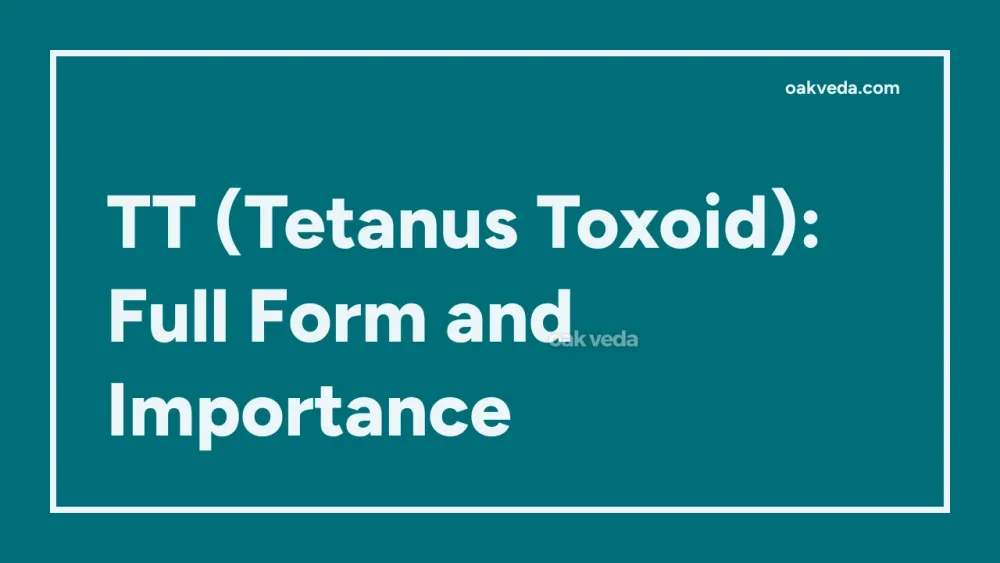
What is the Full Form of TT?
The full form of TT is Tetanus Toxoid. This abbreviation refers to a crucial vaccination that plays a vital role in preventing tetanus, a severe and potentially life-threatening bacterial infection affecting the nervous system.
What is Tetanus Toxoid?
Tetanus Toxoid is an inactivated form of the tetanus toxin, used as a vaccine to stimulate the immune system and protect against tetanus infection. This vaccine is essential in modern preventive healthcare, significantly reducing the incidence of tetanus worldwide.
Origin and Development of Tetanus Toxoid
The development of the Tetanus Toxoid vaccine marks a significant milestone in medical history:
- 1920s: Initial development of the Tetanus Toxoid vaccine
- World War II: Widespread use to protect U.S. military personnel
- Post-war era: Incorporation into routine immunization programs globally
This vaccine's success in preventing tetanus during World War II led to its adoption in civilian healthcare, dramatically reducing tetanus cases worldwide.
How does Tetanus Toxoid work?
Tetanus Toxoid works by stimulating the immune system to produce antibodies against the tetanus toxin. Here's a breakdown of its mechanism:
- The vaccine contains an inactivated form of the tetanus toxin
- When injected, it triggers an immune response
- The body produces antibodies specific to the tetanus toxin
- These antibodies provide protection against future tetanus infections
This process creates immunity, allowing the body to quickly respond to and neutralize the tetanus toxin if exposed in the future.
Types of Tetanus Toxoid Vaccines
There are several types of vaccines containing Tetanus Toxoid:
- TT: Tetanus Toxoid alone
- DT: Combined Diphtheria and Tetanus vaccine
- Td: Tetanus and reduced diphtheria vaccine for adults
- DTaP: Combined Diphtheria, Tetanus, and acellular Pertussis vaccine for children
- Tdap: Combined Tetanus, reduced diphtheria, and acellular pertussis vaccine for adolescents and adults
Functions of Tetanus Toxoid
The primary function of Tetanus Toxoid is to prevent tetanus infection. It achieves this by:
- Stimulating the production of tetanus-specific antibodies
- Providing long-lasting immunity against tetanus
- Reducing the severity of tetanus symptoms if infection occurs
Applications of Tetanus Toxoid
Tetanus Toxoid has wide-ranging applications in preventive healthcare:
- Routine Immunization: Part of standard childhood vaccination schedules
- Booster Doses: Administered to adults to maintain immunity
- Wound Management: Given after injuries with a high risk of tetanus exposure
- Maternal Immunization: Administered during pregnancy to prevent neonatal tetanus
- Occupational Health: Used in high-risk professions (e.g., agriculture, construction)
Features of Tetanus Toxoid
Key features of the Tetanus Toxoid vaccine include:
- Safety: Well-established safety profile with minimal side effects
- Efficacy: Highly effective in preventing tetanus
- Longevity: Provides long-lasting immunity with periodic boosters
- Versatility: Can be combined with other vaccines for comprehensive protection
- Accessibility: Widely available and part of most national immunization programs
Benefits of Tetanus Toxoid
The benefits of Tetanus Toxoid vaccination are significant:
- Prevention of Tetanus: Dramatically reduces the risk of tetanus infection
- Neonatal Tetanus Prevention: Protects newborns when mothers are vaccinated during pregnancy
- Reduced Healthcare Costs: Prevents expensive treatments for tetanus infections
- Herd Immunity: Contributes to community-wide protection against tetanus
- Peace of Mind: Provides reassurance in case of injuries or wounds
Limitations or Challenges of Tetanus Toxoid
While highly effective, Tetanus Toxoid does have some limitations:
- Booster Requirements: Requires periodic boosters to maintain immunity
- Allergic Reactions: Rare cases of severe allergic reactions can occur
- Side Effects: Minor side effects like pain at the injection site, fever, or fatigue may occur
- Cold Chain Dependency: Requires proper storage and handling to maintain efficacy
Future Developments in Tetanus Toxoid Technology
Research continues to improve Tetanus Toxoid vaccines:
- Development of longer-lasting formulations to reduce booster frequency
- Exploration of needle-free delivery methods for easier administration
- Investigation of mucosal vaccines for potential oral or nasal application
- Integration with other vaccines for more comprehensive protection
FAQs on TT Full Form
-
How often should I get a TT booster? Adults should receive a booster every 10 years, or after certain injuries if it's been more than 5 years since the last dose.
-
Is TT safe during pregnancy? Yes, TT is safe and recommended during pregnancy to protect both the mother and newborn.
-
Can TT cause tetanus? No, TT contains an inactivated toxin and cannot cause tetanus.
-
What are the common side effects of TT? Common side effects include pain at the injection site, mild fever, and fatigue.
-
Is TT the same as the DTaP vaccine? No, TT contains only the tetanus component, while DTaP also includes protection against diphtheria and pertussis.
In conclusion, understanding the full form of TT as Tetanus Toxoid highlights its crucial role in preventing a potentially fatal disease. This vaccine's development and widespread use have significantly reduced tetanus cases globally, making it an essential component of public health strategies worldwide.
You may be interested in:

